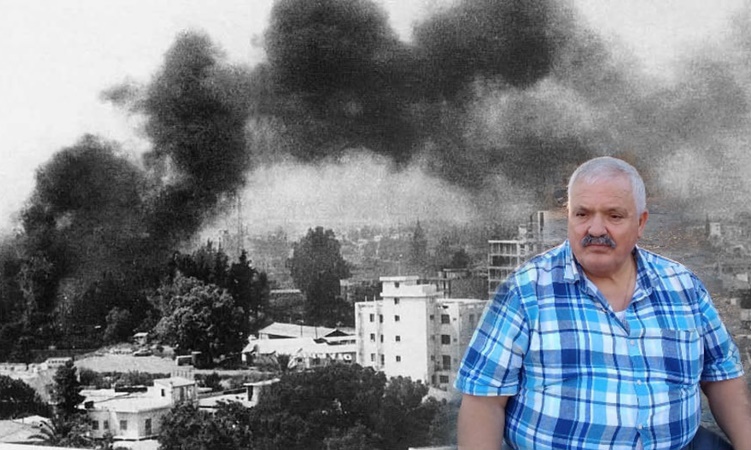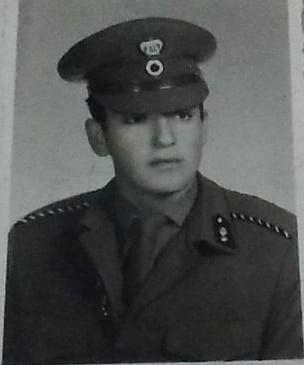Life was in front of him. He had returned from his studies in Great Britain and had been hired as Control Manager of the Salamis Bay Hotel in Famagusta. The then 23-year-old Michalis Stefani Michael from Ardana Famagusta had put his bow to make his dreams come true. There may have been internal unrest in Cyprus but nothing foretold what would follow and how he would be forced to emigrate again in order for him and his family to survive.
"Anyone who lived in August 1974 and says that he does not live with the nightmare will lie", words of the 69-year-old Michalis. 45 years later he remembers and shares with us some of those moments that marked his life forever.
The days before the invasion did not foretell the great evil. "We did not expect war. Only afterwards did I realize some things. "My assistant at the hotel, who was a Turkish Cypriot, Yusuf, had told me a few days before the invasion that he was seeing movements inside the old walls of Famagusta and that foreigners had come and they must have been soldiers."
In fact, as Mr. Michalis noted, "in those days in the hotel we had groups of tourists from Ankara, who later realized that they were Turkish officers who had come to travel to Cyprus to do a mapping, to get the information that they needed. We were sleeping the sleep of the law ".
He woke up for work but… the raids "sent" him to war
The diary wrote July 20, 1974. In the middle of summer, the best time for tourism and the young Michalis, a member of a family of eight, was ready to start his work.
But he did not catch up. The raids on the radio and the call for mobilization put him in the position of driver of his little Mini and wearing his military he started for the camp in Athalassa in Nicosia.
"They enlivened us with slogans and raids on the radio. We were so excited that we thought we would go to the army and throw the Turkish invader into the sea. "Unfortunately, the information that came to us was not real, we did not realize the magnitude of the loss we had, we did not realize the magnitude of the disorder that existed in our army, we did not realize the betrayal."
In the middle of the road, the army ordered them to return to the nearest unit because the camp in Athalassa was under attack by the Turkish air force. The 23-year-old Michalis was enlisted in Proti Anotera in Trikomo, from there he was sent to Pogazi and then he was transferred to Karaolos, outside the northern walls of Famagusta.
"We hit a plane… We went close… I took the sock and it had only the fingers inside"
What happened next is just awful. Facts that the healthy human mind hates. "What happened then is better for people not to remember," Mr. Michalis told us.
His gaze was flat. His eyes were looking in the same direction and it seemed that the images of those days were passing in front of him.
"We were in Monarga in Pogazi. We had just seen a Turkish spy plane flying very low in front of us to photograph the naval base. It was hit by our anti-aircraft guns and exploded in the air. We ran to the plane. What we saw was terrible. I found the pilot's revolver, which had taken the shape of a bow from the heat of the explosion, I found his personal booklet and saw that he was a 40-year-old Turkish pilot. Some of the findings even more horrible. I also found a piece of his spine, which you thought had been devoured by vultures. Inside the left boot, the nylon sock, in which only his fingers remained. The rest had been disbanded. "
We paused for a while. The images in the mind are intense and painful. "The second incident that stigmatized me was when there were battles in Sakaria, Famagusta. The Turkish air force bombed and we, thinking that it was the Greek planes that were bombing the Turks, ran to the stadium and celebrated. Then we were shot at from the walls of Famagusta and someone fell next to me and shouted "They played me, they played me". We went to him. He was lucky because the bullet pierced his shirt but just as it was held in his body ".
Of course, as he told us, there are many such moments. "Anyone who lived in August 1974 and says he does not live with the nightmare will be lying. And it is not fear. It is the pain, despair and crying of the mother, the wife, the children who asked for their own. From where we were passing and they saw us with military, they ran over us and asked us '' Did you see my son, my son? My son, did you see my husband? It was in that place ''. "Some of us even lied that we saw them to comfort them."
He ran to persuade his villagers to leave
"If you have a mother and a sister, run to them. Save them from disgrace ", these were the words he heard, on August 14, from the Major and Commander of his Unit. His Commander had returned from Mia Milia, where he had gone with others to make a line of confrontation. "When he came back he said '' We were betrayed. "They sent us to the front line to slaughter us like lambs."
He listened to the urging of his Commander and left for Ardana. At first he could not persuade his family and fellow villagers to leave. The hours passed. At midnight, after seeing car lights from the roof of his house and not being able to tell if they were Turks, they were persuaded to leave. "We made a procession together with residents of other villages. I had told them that I would move forward and if I found Turks, I would make sense for them to disperse ".
The route is long. With God's help they managed to survive the Turkish fire. After many hours of travel they arrived in Xylofagou.
"We slept 43 people on the floor next to each other"
After successfully completing his mission, leading his family and fellow villagers to a safe place, the young Michalis returned to his Unit, which was located in Kalo Chorio in Larnaca, until the end of September.
"We lived in an erected two-storey building in Xylofagou. At the bottom were only the columns. We slept 43 people on the floor next to each other. We separated the "rooms" with boxes and lay on the hay instead of beds. We had with us an operated aunt of mine, who suffered from cancer, a mother who gave birth in the week of the invasion, we had elders and children. Toilets at all. We dug a hole further and put bags inside. We did more for women. The bathroom was a luxury. As for food, one tried for all and all for one. There was a case when we drove back, not to steal, but to find something to eat. We went to fields, somewhere we found beans, somewhere zucchini, somewhere grapes and we collected for everyone. In those days no one said anything. There was so much solidarity that they shouted at you to go and cut. We did this process for two weeks. "
Exile was a one-way street
He had made a decision. He could not survive like that. Neither he nor his family. He would leave for England, where his relatives were. But there was no money. So they were forced to borrow. There were no planes. Only one ship that sailed to Athens.
Young Michalis boarded the ship and said goodbye to his family once again. He left them behind in hardship. He abandoned them so that he could help them. He stayed for a few days with Cypriots in Athens and borrowed a ticket for Heathrow.
"None of my relatives at Weston Super Mare knew I was going because there was no way to communicate. I remember when my uncle saw me, he shouted "miracle, miracle". They did not believe that I was safe and sound. Everyone ran to find out the news because the only way to inform them about Cyprus was by radio. Personally and for each of us, they did not know what our fate was ".
All Cypriots in the region became a fist for those who suffered in Cyprus. "We were sending money, clothes. We organized something like banquet, dance and we sent all the proceeds to Cyprus. Of course, later we realized that the money did not always go where it should and so everyone sent it to their own ".
Arriving in England he knew that communication with his family would now be difficult. Long wait. Until you send the letter, they will answer you and it will come. It took about five months for the telecommunications lines to be restored but again the process was difficult. But he had made a decision. The goal is hard work to get them on their feet. He worked in restaurants, passing from the position of waiter, cook, laundry.
"With hard work we stood on our own two feet, we helped our people in Cyprus. In two years I rented a shop, which I later bought. At the age of four, I started a hotel with my uncle and bought a house. I got married, started a family and eleven years later and after my children started going to school I decided to return to Cyprus ".
He stood up, reunited with his parents and siblings, raised his family but he will never forget and will never stop hoping that one day he will return to the village of Ardana Famagusta.
Source: cyprustimes



